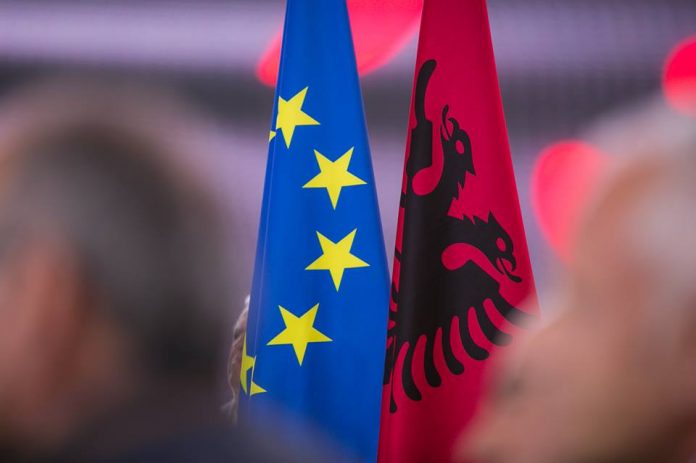Albania’s 2024 Progress Report issues call for constructive dialogue in Parliament

In its Progress Report for 2024, the European Commission emphasizes the urgent need for a constructive and inclusive dialogue within the Albanian parliament. This message was echoed by Silvio Gonzato, the EU Delegation Ambassador in Tirana, during a press conference with Prime Minister Edi Rama, where he formally presented the annual document detailing Albania’s integration process.
Why is this important: For the past month, the opposition has resorted to violence and disruption of parliamentary sessions. Their action has escalated into violent protests, and risk having an impact on Albania’s integration process.
Context: The protests were initially formally tied to the sentencing of the deputy chairman of the Democratic Party, for false reporting, but have escalated into acts of violence and attempts at civil disobedience that many suspect are motivated by the legal difficulties of the Democrats leader who is awaiting trial for corruption. The opposition accuses the Prime Minister of controlling the Special Structure Against Corruption and Organized Crime to unjustly punish opponents, including by placing their leaders under house arrest for corruption allegations. The Special Structure, operational for five years, has also targeted numerous members of the ruling party, including a former deputy prime minister.
What was said: Ambassador Gonzato urged the opposition to participate in the approval of reforms necessary for Albania’s EU membership within this decade. He stated, “Considering the importance of reforms that Albania must undertake, it is crucial for the opposition to come to the table. The success of Albania belongs to everyone, not just the majority or the opposition. Everyone must feel ownership in it.” He condemned the use of violence in political discourse and expressed hope for a path to re-engage the opposition in constructive dialogue.
The Prime Minister also expressed the ruling majority’s willingness to engage in dialogue but pointed out that the opposition’s violent actions hinder constructive discussions. He remarked, “It takes two to tango; dialogue cannot happen if both parties are not willing. Those who feel excluded are making a self-exclusion choice without any factual basis related to our approach.”
Opposition response: In response, the leader of the Democratic parliamentary group accused the EU ambassador of concealing reality with “pretty words,” asserting that the opposition feels excluded from Parliament. Bardhi stated, “The call for the opposition to play its role in Parliament is contradicted by the reality of its exclusion without legal grounds.” He emphasized that persistent violations of the Constitution could lead to a zero-sum situation for parliamentary coexistence between the majority and opposition.
The leader of the Democratic Party, currently under house arrest, criticized Rama’s willingness for dialogue, saying, “What kind of dialogue does Edi Rama seek, especially with the imprisonment of key opposition leaders?” Despite the opposition’s stance on justice, the Progress Report highlighted concerns about corruption levels while praising the Special Structure for its efforts against this phenomenon and organized crime. This assessment was reiterated by Prime Minister Rama during the press conference.
What’s next: As Berisha’s trial approaches and the 2025 elections draw near, there are rising expectations that the opposition will intensify its activities. However, despite the increasing aggressiveness of their political strategies, characterized by disruption and violence, the opposition appears to be further isolating itself.


